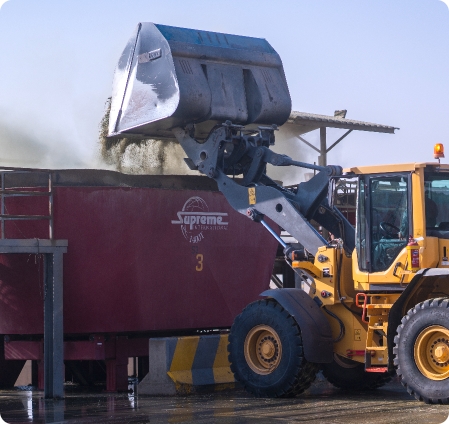Everything, from people to plants, relies on a thriving environment for survival. However, resources are getting increasingly scarce and preserving natural capital and biodiversity is critical.
We are increasingly minimizing our waste and visioning waste as a valuable resource. Through process efficiencies in our operations, we are encouraging waste recycling and diverting waste away from landfill. One of the most effective ways of reducing food waste is prevention. To this end, we are working hard to ensure that our demand forecasting is highly accurate to avoid food waste generation and unnecessary cost to the business and the environment. Where possible, we also seek to recycle as much packaging and process waste as we can from both our manufacturing and distribution facilities. We have maintained partnerships with waste management companies that specialize in the recycling of challenging materials, such as shrink wrap, into various other materials, diverting them from landfill.
We have been conscious of understanding where our waste goes and reviewing this against the waste hierarchy. In the GCC, we have been working on several initiatives that look to, where possible, keep waste in the more favored prevention category on the waste hierarchy, treating it as food surplus and avoiding disposal to landfill. Our waste steering group serves as a collaborative knowledge sharing platform and plays an important role in driving initiatives as we work towards our strategic goal, to reduce waste going to landfill across all our divisions by 50% by 2025 (against a 2018 baseline).

In 2021, our waste efforts continued with improvements across our various waste reduction targets. In 2021, total waste generated decreased by 6.92%, waste recycled increased by 6.82%, and 33% food waste diverted from landfill compared to 2020. As a result of these improvements, we accomplished 40% reduction in waste going to landfill across all our divisions by 2021 (against a 2018 baseline).
We commenced a new partnership with a third-party provider in Dubai, who recycles packaging and recovers water for reuse. This provider redirects a significant element of surplus products to ensure the plastic is recycled, the water recovered, fats are converted into biofuels, and proteins sent for animal feed. We have also continued to expand our procurement efforts for additional partnerships with public and private sector entities currently being explored.
Almarai’s poultry litter charring operations in Hail has started producing organic fertilizer. The EcoChar Gasification plant located in the facilities, is running in line 6 Hadco, producing a carbon-rich product obtained when biomass is heated in a closed container in either an oxygen-starved or oxygen free environment. The product itself consist of high phosphorus, potassium, magnesium, and carbon values and can hold 2.5 times its volume in moisture. This product has superior nutrient -retention properties and is more valuable for improving stability in soil compared to biochar. EcoChar, considered as the premium version of biochar, can increase the crop yields, boost the agriculture, and has a variety of other uses, including animal feed supplements, bedding, and use as a water filtration medium.
| Goal/Target | Progress |
|---|---|
| Reduce waste going to landfill across all our divisions by 50% by 2025 (against a 2018 baseline) |